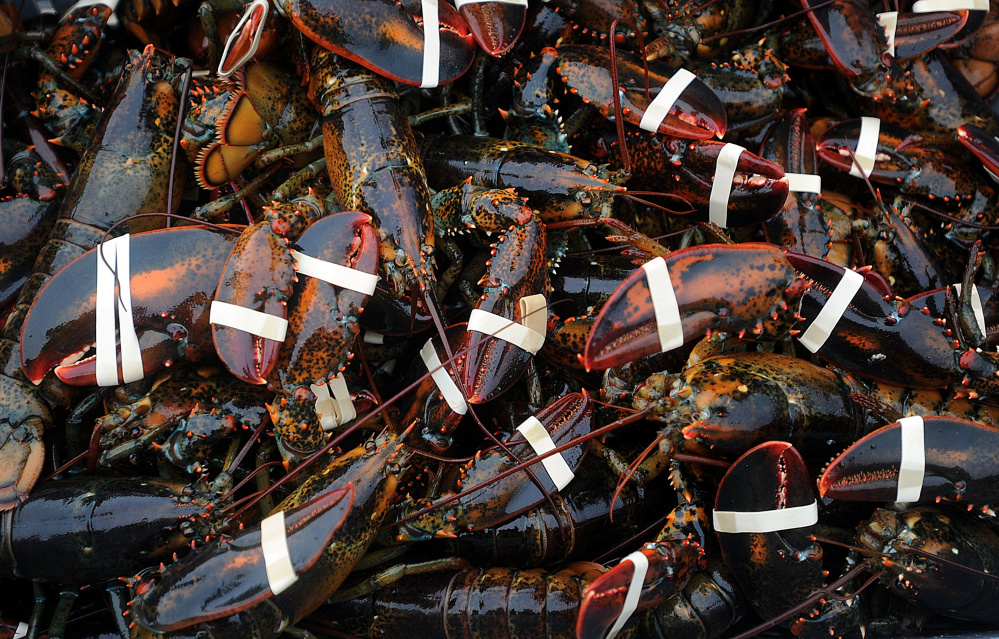The lobster fishing and export industries and Maine’s congressional delegation are moving swiftly to pressure the European Union not to approve a Swedish proposal to list the American lobster as an invasive species.
Such a listing would effectively ban 28 member nations from importing live American lobster, also known as Maine lobster, from the United States and Canada, and could cost U.S. lobster fishermen and exporters $150 million a year, including about $10.6 million in Maine.
Maine’s congressional delegation sent letters Monday to Secretary of State John Kerry, U.S. Trade Representative Michael Froman and NOAA Administrator Dr. Kathryn Sullivan, calling on them to protest the proposed change in EU trade rules that have worked around the globe for decades.
“We urge you to engage in immediate efforts to ensure the continuation of safe and responsible import of live Maine lobsters, consistent with the EU’s World Trade Organization obligations,” wrote Sens. Susan Collins and Angus King and U.S. Reps. Chellie Pingree and Bruce Poliquin. “Since only a small number of Maine lobsters have been found in foreign waters, we believe regulators should take a more finely tuned approach before calling this an ‘invasion.’ ”
Swedish scientists have said that 32 American lobsters have been found in that nation’s waters in the past eight years, and that the species poses a risk of disease and health problems for native European lobsters.
But a sentence in a risk-assessment report by Sweden’s agency for marine and water management suggests the proposed ban may be motivated by a desire to expand the European lobster fishery, said Annie Tselikis, director of the Maine Lobster Dealers’ Association.
“It should be stressed that a ban on live imports would potentially be beneficial in terms of profits and jobs if the commercial fishery of Homarus gammarus (European lobster) is positively affected by the ban,” Tselikis quoted from the report.
“We are working this from a number of different channels,” Tselikis said. One of them, in cooperation with “our partners in Canada and the United States in conjunction with our European Union colleagues, is to find out what the motivation is with the Swedish risk assessment – is it scientific, is it economic, is it both, and can we come to a point where we can ship lobsters without doing an all-out ban.”
A coalition of fishing industry experts and scientists from the U.S. and Canada is conducting an independent evaluation of the 85-page risk assessment.
The evaluation is being performed by the National Oceanographic and Atmospheric Administration, the Canadian Department of Fisheries and Oceans, and two industry groups, the National Fisheries Institute in the United States and the Fisheries Council of Canada. The independent review is expected to take up to three weeks.
So far, American scientists interviewed about the potential ban said they were skeptical of Sweden’s rationale, which identified three diseases it considers the biggest threat to European lobsters: epizootic shell disease, gaffkemia or “red-tail,” and white spot syndrome.
Robert Bayer, executive director of the University of Maine’s Lobster Institute, said there is no scientific basis for Sweden’s proposed ban.
Shell disease, a fatal bacterial infection, has been shown not to be contagious, he said. Red-tail, also caused by bacteria, has not been seen in American lobster in a decade. And white spot syndrome affects only shrimp, not lobsters, Bayer said.
Gunvor Ericson, secretary of state for the Swedish Ministry of Environment and Energy, said in a March 18 telephone interview that the country’s marine agency has determined that American lobsters should be banned because of their potential to harm European lobsters.
Ericson said the agency believes the 32 American lobsters found in Swedish waters were imported from the U.S. and then somehow ended up in the ocean.
In their letter to the administration Monday, the Maine delegation pointed to reports that have suggested individuals are releasing lobsters into European waters after their arrival.
“If this is the case,” the delegation wrote, “such a violation should be handled first by local law enforcement, rather than used to erect a barrier to legitimate international trade.”
Patrice McCarron, executive director of the Maine Lobsterman’s Association, said the fracas with the Swedes has been a source of bewilderment for fishermen.
“That’s the kind of issue that has fishermen scratching their heads,” she said. “It really doesn’t pass the straight-face test.”
Copy the Story Link
Send questions/comments to the editors.





Success. Please wait for the page to reload. If the page does not reload within 5 seconds, please refresh the page.
Enter your email and password to access comments.
Hi, to comment on stories you must . This profile is in addition to your subscription and website login.
Already have a commenting profile? .
Invalid username/password.
Please check your email to confirm and complete your registration.
Only subscribers are eligible to post comments. Please subscribe or login first for digital access. Here’s why.
Use the form below to reset your password. When you've submitted your account email, we will send an email with a reset code.